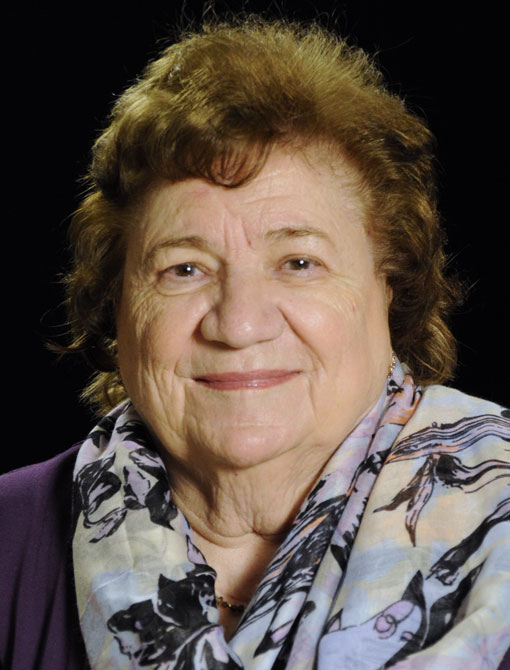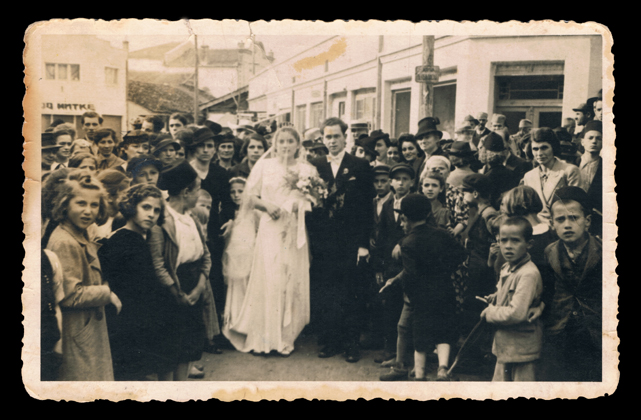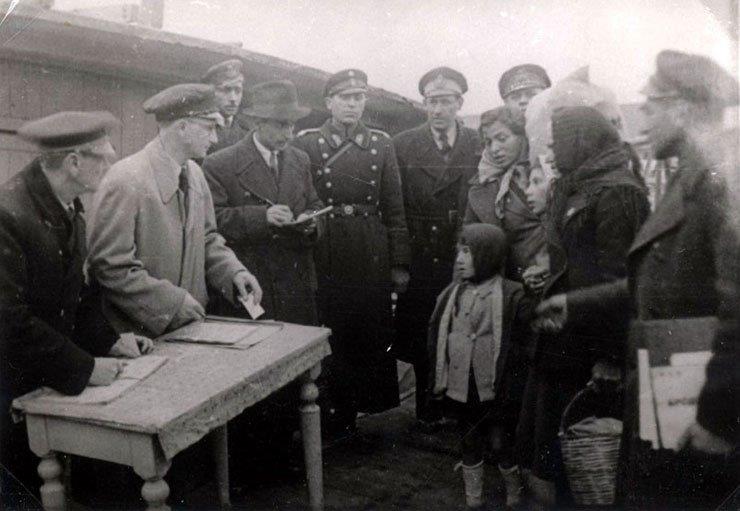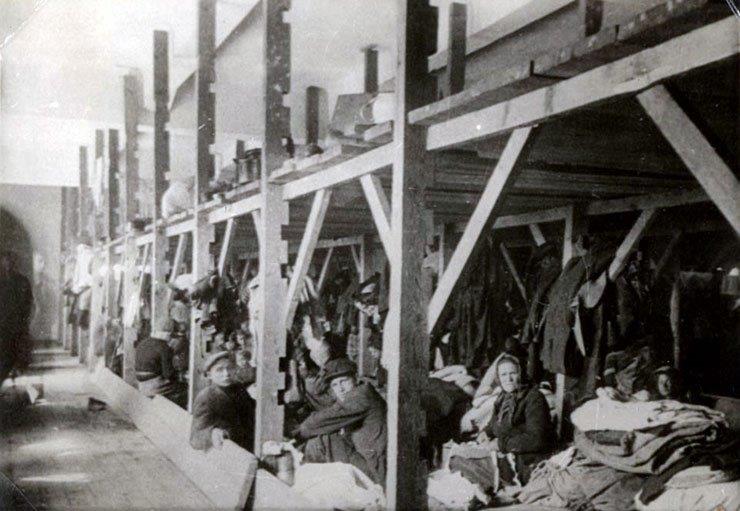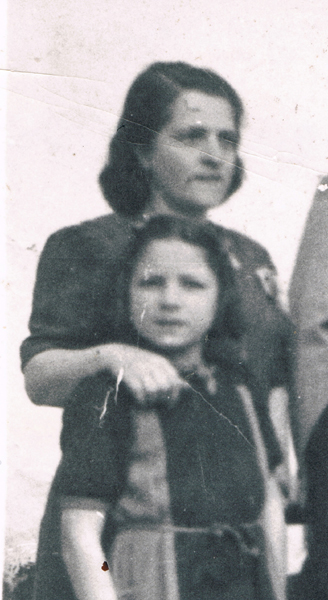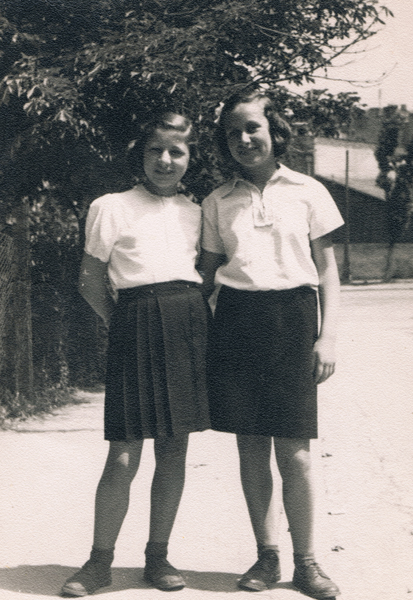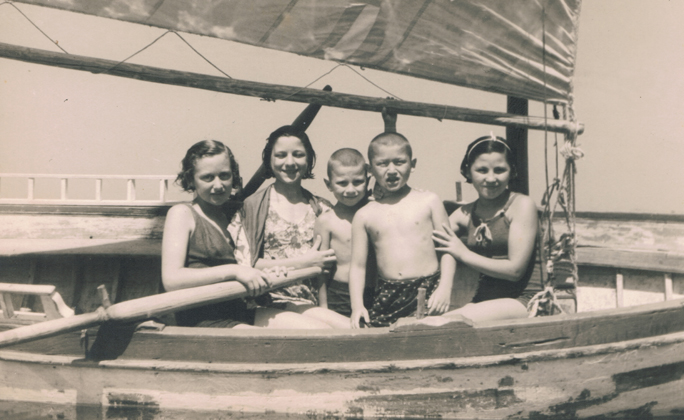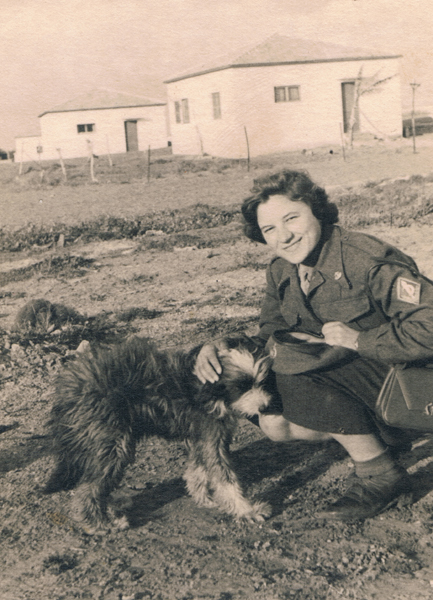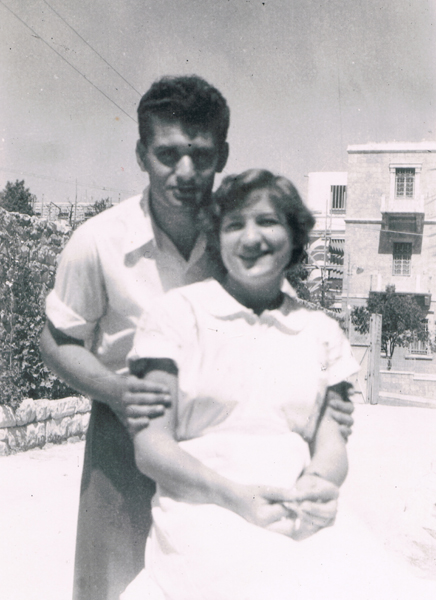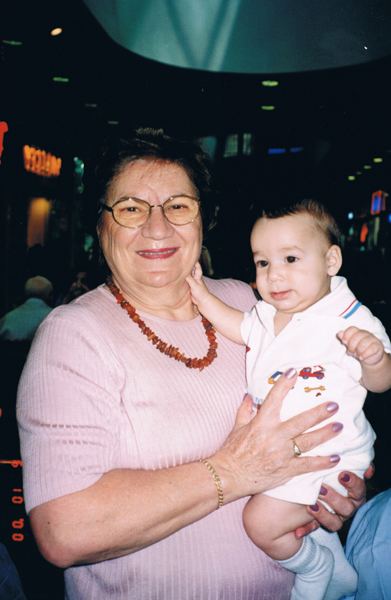On Holocaust Martyrs and Heroes Remembrance Day in 2015, Shela Altaraz was one of the Torchlighters along with five others. Altaraz, the sole survivor of the Jewish community of Štip, Macedonia, that perished in Treblinka, says “until today, on the deportation lists, I am registered as deceased along with my entire family. I haven’t corrected that Rochale Tzion died in Treblinka with the rest of her family.”
In an interview first published in our Hebrew e-Newsletter for educators, Shela Altaraz, nee Tzion, describes the hardships she endured during the war as an 8-year-old, some of which she remembers in great detail. During the interview with us she explains: “I've adopted a habit: I don’t want to know too much. What I know is enough. Why didn’t I ask? Because I don’t wish to. I don’t need more headaches and stomach-aches.” Against all odds, she survived the terrible journey in horrible isolation, and remained the sole survivor.
Tell us about yourself and about your family.
I was born in 1934 in Štip, Macedonia. I was the youngest daughter. Both my sisters were married. My sister Julia was married to Solomon and lived in Štip, and my sister Bella, who was married to David, lived in Kosovo. My brother Moiz studied medicine and was 12 years older than me. I was very much loved and spoiled. I have never again witnessed such love as I had received as a child from my mother, sisters, and relatives. I was a very mischievous girl. My father, David Sion (Tzion), was a cattle merchant, and he owned a kosher slaughterhouse, though he supplied meat to the army and the whole city, and even exported some to Greece. Our family was very wealthy. My mother, Dodan Sion, was a housewife. Tall, dark, thin, she was the most beautiful women in the world – if such a thing exists.
We were a traditional and observant family, as were all the families in Štip. We were acquainted with Christian families, but it was a casual acquaintance, like when playing in the streets. No Christian ever entered our home, and Jews also didn’t enter Christian homes as far as I know. They were very afraid of assimilation, and so kosher practice was strictly observed that way. Holidays were always ritually observed. I remember that during Passover all the food was prepared at home, and we were sent to a special bakery for Jews only. At home we probably spoke Ladino. I didn’t realize I spoke Ladino until I [later] discovered I speak it so well that it must be my first language.
The synagogue was in the center of town. It was in a two-story building with a staircase, and beneath it was a coffee house with tables and small chairs, and people would sit there, Jews and Gentiles, drinking coffee together. The Rabbi had grey hair and I thought he was an old man. Since I had never known my grandfather, I adopted the Rabbi as my grandfather, and he spoiled me.
I studied in a Christian school in the mornings, but in the afternoons I went to the Jewish school. Life was normal and good, we got along very well with our Christian neighbors, and played jacks or tag around the house like all children. It was so fun.
What experiences do you recall from your home? From the town?
If I could draw, I would draw every corner of the house, I remember all of it. The house was a two-story house. From the main street on which we lived you had to take three steps down. The house had a day room, a living room, in which there was a fireplace, a dining table and a sofa – whoever was tired after a meal could lie down on it. Upstairs were the bedrooms. We used to make alcoholic beverages in our house. I remember that the cellar door was open one day. I went in and saw a huge jar of cherries. I took a cherry, and another, and another, and I probably got drunk and fell asleep there in the cellar. My mother was looking for me, I was the youngest and she was crazy about me and watched over me… they went to look for me at my father’s [shop]. Until I woke up. “Where were you?!” – “I had some cherries, I was here….” Then they figured out what happened to me.
My town, Štip, was very beautiful at the time. Small houses, a river running through the town, little bridges connecting the two banks. I loved it very much. I used to go about freely. As a seven-year-old, I knew everyone. There were no cars, no limitations, no fear or stress. I remember being sent on Purim with a traditional food package to my uncle, who lived across the river. I passed the bridge and saw some friends of mine who were playing on the river bank. “Come, Rochale”, they called. I said, “I’ll be there soon. I just have to deliver the package.” Unintentionally, I bent over too much and fell into the river. The stream carried me quite far, until someone from the coffee shop jumped in and got me out. That’s how I survived the first time. It was scary…
In April, 1941, Macedonia was invaded and annexed to Bulgaria. Did you feel the occupation?
I remember one incident. We were alone, mother and I, at home. One evening, some Bulgarians came and threw us outside, like we were objects. Luckily, we had Jewish neighbors across the street. They let us in and we saw everything. They looted the house, made a mess, and dismantled chairs for heating. In the morning they got drunk (there were plenty of cherries there…) and then they left. We went back home. I remember mother saying “I’m going to file a complaint!” But people around her said, “Who are you going to complain to? Go back in, keep your mouth shut, and accept it as it is.” The older people probably sensed the threat. Before that, everything was normal, we were on good terms with the Christians; you couldn’t really distinguish between Jews and Christians.
On March 31st, all the Jews in Macedonia were deported. What do you remember from that event?
Before the war father died of appendicitis despite being a strong, handsome and young man. There was no cure at the time. The entire family gathered during the shiva, the mourning days. My married sisters returned home as well as my brother, the medicine student. On one of those days when we were all at home, we talked until the middle of the night and we were happy to be together. I remember them saying, “We are so lucky to have this little one, she diverts our thoughts from the grief over father’s death.” And I was walking around among them, and heard everything… and we went to sleep. Suddenly, in the middle of the night we heard rifles banging on the door. Someone opened it and two armed soldiers - Bulgarians, I think - in uniforms, shouted, “Get up! Get dressed quickly. In half an hour be downstairs in front of the house. Don’t take clothes and belongings. If you want you can take a few valuables.” We got dressed and everybody took what they had. We went downstairs to the street and saw a long line of people. That was at 4:30 am on March 11th, 1943. It was drizzling and it was cold. We wore hats and coats. We were walking in a long procession, and as we marched forward more people joined from houses along the way to the train station. At the station, we saw people sitting at a table with pens and papers, and we were quickly checked. I had little gold earrings, and mother had rings and jewelry. It was all torn from us. Our pockets were searched, the inseams on our clothes were felt, and all the valuables and money were taken from us. I remember that they were ripped from our bodies, my ears were hurting. And who ripped them from our bodies? My school teacher! I went to her. I was glad to meet my teacher…. “Scram Chipotka (derogatory term for Jews)! If not, I’ll kill you!” I couldn't believe my ears… You see a teacher you study with every day, and suddenly she is so frightening. The teacher wrote down what was taken from the Jews. It was all organized.
What happened on the train platform on March 11th, 1943?
After we passed the inspection, we were packed on a long freight train, whoever couldn’t get on it was shoved in. Mother held my hand tight so we would be able to get in together. That was my first shock. I was so frightened. Outside it was cold, but when we entered the train cars there was no air. It got hot, there was no window, no air vents, and it was unbelievably crowded. I remember I couldn’t even move my arms. I was a small girl, and everyone was tall, and I started to cry. I learned then I shouldn’t cry. “Don’t cry! Don’t cry, girl!” that was the first time I was told not to cry. And I don’t remember crying much since then during that period, I really didn’t.
Where were you deported to?
We rode in these crowded conditions for 3 or 4 hours to Skopje, the capital of Macedonia. There was a tobacco factory there called Monopol (Macedonia was known for its good tobacco). When we got there we were taken quickly to the rooms. I’ve never seen such a big room! There were four rows of sleeping bunks, each one with three levels. The widows were bricked and cemented. The only light at the entrance was from a light bulb hanging on a wire, and another at the end of the room. I was frightened and didn’t want to go in. There were about 500 people there from Macedonia and Greece. The whole family was assigned to bunks. We were on the third level. Mother, my two sisters, and I were in the women’s room, and the men were in another, my brother and my brother-in-law. The sleeping bunks were built in such a way that only I was able to sit upright, the adults could only lie down. Life there wasn’t simple: filth, hunger, crowding… You could only go to the toilet once in a while. That was the only exit allowed from the room. There were babies and old women, and everybody lay down on their backs or their bellies. There was no work. Like nesting hens, with one light bulb in the front and one in the back, lying down the whole time. I often asked to go to the toilet. Next to the room and along the way to the bathrooms there were armed soldiers, as if there was an army there about to attack them. There were only three toilets. There was no possibility of washing your hands and face, let alone having a shower. We went to sleep and woke up in the same clothes. There was no mattress and no blanket, our luggage was used as pillows. We placed our shoes next to the pillow. They would throw in food, pieces of bread, because they couldn’t come in (because it was so crowded). I don’t remember drinking during that time. I don’t remember any water. Sometimes they would bring us salted fish, which only increased the thirst, and sometimes other dry food that they could throw at the women in the bunks. I lived there like that for about three weeks.
How were you released from Monopol?
One day my sister was called, and was told, “Take your things and go." (Bella was an Italian citizen since Kosovo was under Italian rule.) The entire family came down to accompany her. We hugged and cried and said our farewells, and as we were doing that, my mother pushed me towards her and said in Ladino, “Toma esta chikitika”, take the little one. Who can say no to Mother? She turned around, held my hand and said, “Go!” and that’s how we got out. From the moment we left, her hand was shaking terribly and I held on tight. I didn’t understand why it was shaking so much. We walked about a hundred meters towards the exit, where we were inspected. They didn’t even ask about me, they didn’t pay any attention to me. Bella was probably afraid to get caught for taking me out like that without permission – It would have been a death sentence, that’s for sure. The moment we were out she burst out crying, and I cried with her. I didn’t understand why she was crying, but I cried as well. She was 24; and I guess I was lucky I wasn’t noticed.
As we got further away we heard a big freight train, I don’t know if my family even managed to get back to the rooms. They started dragging people, babies, elderly and pregnant women. There was crying, screams of prisoners, screams of soldiers, hitting with whips and rifles. People who lie down for three weeks can’t move, can’t walk… They were dragged and pushed onto the carriages, and my sister said, “They’re taking them. They’re taking them.” We saw all this from some hilltop, we hadn’t got very far yet. It was indescribable… a horrible noise. They were packed into the cars the same way we were the first time. They were all taken to Treblinka, but of course, I didn’t know that then. It was the last time I saw my family. At some point I fell asleep, but my sister stayed awake to watch the whole thing. We never spoke about it, I never cried. Never. I avoided speaking with her about what happened, maybe to spare her… and she didn’t speak to me, maybe in order not to make me sad.
What did you do? Where did you go?
We waited until the sun rose the next morning, and then we travelled to Pristina, where Bella’s mother-in-law lived. Her mother-in-law welcomed us, but it was a reserved welcome. She was bitter. Her son David, my sister’s husband, was a Yugoslav POW soldier captured by the Italians. Bella started working as a seamstress, and I stayed with her mother-in-law. In the morning, she gave me a slice of bread and asked me to get out of the house until late in the evening. When I got back my sister yelled as me, “What are you doing out until such a late hour? You could be kidnapped! I can’t take care of you, too!” I didn’t tell her even though the story repeated itself every day. My sister’s life wasn’t easy. One day she decided to commit suicide, and unfortunately I saw everything. I saw her in her last moments, and she looked into my eyes as if she was asking for forgiveness. After a while the coachman came and took her. I ran after her. I wanted to be with her. I think he was the one who buried her. There was no funeral. I was left alone with the mother in law and I was afraid of her.
Two days later, Sonia Cohen, a relative who was Bella’s friend, arrived. Her husband was captured with my brother-in-law. She asked if I would like to go with her, and I immediately agreed even though it was the first time I saw her. She took me and I was happy. I helped her with cleaning and shopping. I was with her for about six months, just the two of us. I didn’t cry about my sister nor anything else. One day, I went to the grocery shop, as usual, and the grocer asked me, “What are you doing here, girl? Go tell your lady that all the Jews were rounded up last night and there are no more Jews in town.” I ran quickly and told her. Sonia packed some clothes, we left home and started running. Sonia went to some Muslim acquaintances, going from door to door, but no one was willing to take the risk. Everyone was afraid to shelter the Jews, it was a certain death sentence. We arrived at someone’s house, and he said, “I can take you in for the night. Sleep on the porch, but tomorrow go to Gjakova, a Serbian town, to a Muslim family.”
We left the next day, and Sonia kept telling me, “You are not a Jew, you’re Muslim and your name is Salima. I didn’t know their language, they spoke a local Kurdish dialect, but a child doesn’t need a language to get by…
How did you feel in the Serbian village? How were you accepted by the Muslim family?
They were herders, and I went out with the rest of the village children to the pasture. I spent my time with them, a child like all children. I was free, and I experienced the air of childhood. I was very filthy and there were lice on my clothes, my body and my hair. No one paid attention if I bathed or not. I don’t remember bathing at all during this time. There was no running water in the houses, and people used to go to bathhouses once in a while. After some time, I contracted Typhus and ran a very high fever. They put me in bed, undressed me, tried to cool me off with a wet sheet, but it didn’t help. I was taken to the hospital. I was very sick. I was warned not to say I’m Jewish, but someone probably informed on me, and before the treatment was completed we ran back to the village. Sonia sat me on a pile of straw in a field for several days. I didn’t get any food, I couldn’t drink, and I couldn’t walk. The informants kept looking for us, and the Muslim family suggested that we hide in the cowshed.
After we were found, we were transferred to a jail in Pristina with criminals, communists and such. We were there for two weeks, probably in the beginning of 1944. We were told that we would be moved to a concentration camp for political prisoners (probably under German command). We were three female Jewish prisoners – just the two of us and another woman, all the others were Christian. They didn’t know what to do with us or where to transfer us, there weren’t any Jews left anymore.
What does a little girl do in a concentration camp?
There were two women’s rooms at the camp. And the men’s quarters were behind a fence. At 6 am everybody went out to work. I got up with the adults, but I was the only child at the camp. All day, I was there with the armed guard at the entrance gate. At first, I didn’t have any work, so I used to sit on the sidewalk and fall asleep. I was still weak because I hadn’t fully recovered, and also from the lack of food. After a while, they gave me a box and told me to clean the yard, so I cleaned it and the latrines as well. Afterwards, I would dose off and wait for the prisoners to come back. I didn’t make any contact with anyone, not even with Sonia, she was too tired to take care of me. Everyone was tired and hungry. I was nicknamed “the mute” because I didn’t speak with anyone. I didn’t know what was allowed or not allowed to be said, and therefore I was “the mute”. No one paid any attention to me. No one asked what I did during the day. I was a blond girl dressed in rags, I went to sleep and woke up in the same clothes. I couldn’t wash myself. Outside there was a water tap the prisoners used for washing. But I was cold and I was weak.
They used to hang prisoners in the camp. Many times we were forced to go out and stand in a circle, and someone would be hanged. Why? I don’t know. But a child seeing people being hanged... that’s not easy. In my fear I looked for Sonia but couldn’t find her. I had no one to hold on to… At night, I had nightmares and I screamed, I disturbed the other prisoners. I disturbed them at night and was silent during the day… I was there for about 7 months. Each morning, I was completely alone in a camp surrounded by a fence, and an armed soldier. A child that doesn’t laugh or speak. Is that a child? It isn’t.
What do you remember from the day of the liberation?
One day, we heard a lot of airplanes. The doors were opened and both the guards and the prisoners escaped. Everyone escaped, Sonia too. I couldn't run after them; I ran and ran and then noticed they were all gone, and I was left alone in a field. I was very frightened. All the tears I held back for so long… I started screaming. Somebody passed by, "What are you doing here, little girl?" I said, "I am Jewish and I was held in the concentration camp here, and I don’t know where to go." – “Where do you need to get to?" I said, "Pristina. Is it far? Take me there and I'll get by." He took me to Pristina. I don’t know who helped me, who that man was. During my harrowing journey, I was helped by many people with whom I had no connection or relations, not by family and certainly not by acquaintances. I was a child, who could have I known?
Did you meet anyone you knew in Pristina?
The stranger took me to a house of three Jewish women who also had recently returned from the concentration camp Bergen-Belsen, like all the other Jews in Pristina. They saw a filthy child. First, they took off all my clothes and burned them. They cut off all my hair – my head was completely wounded, there were sores all over my body because of the putrid filth. I had blisters on my hands – they said it was because of fear… I was washed. They treated the wounds on my head and body with leeches. No crying, no complaining. Whatever they do with you – you accept. They might as well have killed me – whatever. I didn’t complain. I was kept there for several days, until someone said, "Please take the poor girl, she has no one…"
I was transferred to another family. It wasn't easy, apparently I used to wet myself from fear. I stayed with that family some time, but it wasn't easy to return from the camps and take care of a strange child that wasn't yours. They were also one of the Jewish families that had returned from the camps. They had their own problems, and they weren't healthy. So I was transferred from home to home for a short while, until someone said, "Why does she have to be moved around like that? There is an orphanage in Belgrade."
What do you remember from the Belgrade orphanage?
I was taken to the orphanage in Belgrade. Finally, I met people like me - frail and neglected orphans. I felt I arrived where I belonged, so I cried. "Cry… cry…," they said. So I cried.
I weighed very little. My stomach was swollen, and because of the Typhus I couldn’t walk. I was taught how to walk again. I was given special food that other children didn’t get. "Do you want some chocolate? Do you want some cake? We have sweets." They took me to the nurse's office and gave me nice things to eat to raise my appetite. I went to school, after four years of not studying because of the war, I was put in a lower grade…. I was at the orphanage for three and a half years.
When and why did you decide to immigrate to Israel?
Emissaries from Israel arrived in Belgrade. In a meeting with Deputy Prime Minister Tito, Moshe Byada said to the orphanage delegation, "Look, children, you're here alone, and you'll be alone there too. At least here you're going to school. Graduate, become adults, study whatever you want and go wherever you want. Why do you have to immigrate to Israel, and move to a new place again?" But as children are, if one wants something everybody else insists. "No, we want to go to Israel." After that, they dispersed the children among families. "Do you have anyone?" – I didn’t have anyone. I was sent back to Pristina in order to join people I know and travel with them to Israel. And I actually found a family that wanted to immigrate, but they changed their mind. I said, "You can stay here, but I want to immigrate. Take me back to Belgrade.” I was returned to the orphanage in Belgrade.
In the beginning of the journey to Israel, each child was paired with an adult, and we all met on the boat. When we boarded the train in Belgrade, I was paired with a woman who traveled on her own. I had never seen her before, I don’t know her name, I'm not even sure if I knew it then. We got on the train, we passed through the inspection. "Who are you with?" - "I'm with this woman." - "Who is the child?" - "I'm her care-taker". It wasn't allowed to take valuables out of Yugoslavia, and she gave her valuables to me because children weren’t inspected. We boarded a ship and I have never seen or heard from her again. When we arrived in Israel, I was taken to a kibbutz along with three friends from the orphanage.
Tell us about your first years in Israel.
I was in several kibbutzim and my name was changed to Tamar, because Rachel is a an old ladies'. "How can a sweet young girl be called Rachel?" In the kibbutzim where there were new immigrants it was fun. They didn’t speak our language, and we didn’t speak theirs. They taught us, and we didn’t understand what they were saying. We had fun…
I joined the army, the Nahal branch, and lived in a kibbutz. I felt great, it was wonderful. But the local members of the Ha'shomer Ha'tzair were tough. They didn't understand me. "Where are you from? The Holocaust? Oh, you probably went like sheep to the slaughter." From then on, I never mentioned I was a Holocaust survivor. I was ashamed of it. They had no idea what it meant to be a Holocaust survivor. I begged them to allow me to study to be a nurse while I was in the army. I wanted to give something back to others. "No, we have no budget for that." - "But it's not on your budget, the army will pay for it." They insisted and didn’t authorize it, and I left the kibbutz in middle of my army service, trained to be an army medic and accompanied the soldiers on their training missions.
After finishing your army service you were on your own for the first time. What did you do?
The last day of my service arrived. Where to go now? I wasn't a kibbutz member anymore. All the other soldiers went home. "Shela, give us your address," and I said, "I’ll write to you". I stood there with my kitbag not knowing where to go. It was a hard period in my life. I went to stay with relatives who had three children. They were poor. I didn't even have a bed to sleep in. "Stay with us, you can help us with our income." But I decided to move on. I tried staying with another family I knew, but they said they had no place for me as soon as they saw me. "I only came for a visit," I said. Eventually I arrived at Moshav Kidron because there were Yugoslavs there. I stayed with the Solomon family whom I knew from Pristina, and they accommodated me whole heartedly. By coincidence, their daughter, Julia Cohen, who lived in Jerusalem with her husband, was there, and she told me to come and visit her if I ever get to Jerusalem, so I did. I was stuck in their throat for three and a half months. They saw I had nowhere to go and didn’t try to push me out. I had no money for an apartment either. Eventually, they got a visa for Caracas. Julia went with me to look for a room to rent, and off they went. Amazing people. I don’t know if I would have done for someone what they did for me. An amazing young couple.
So I stayed in Jerusalem. I worked in Talbiya Psychiatric Hospital. Was it the right job for me? No. But I got what I could get. I would get back home, to my room, alone, with all the stories the patients had told me all day… I almost went mad; I was almost out of my mind. I took on all the depressions and anxieties of the patients. I didn’t have anything to eat. If I ate in the morning that would be all until the next day, and in addition it turned out I was ill, I had an amoeba infection from the kibbutz.
How did you meet your husband Avraham?
I met Avraham in the kibbutz, during my army service, but we didn’t keep in touch. By chance I met him in Jerusalem. He made me sandwiches once in a while. Then he brought me home, to his mother. Finally, I met some good people, I wasn't used to it anymore. I lived with them for six months before I got married. I went to see a doctor because of all the vomiting from the amoebas. How can you tell a doctor you don’t have a home, nowhere to lie down, that it's not your home; that you can’t lie down because you live in a stranger's home. Despite being very ill, I held on, I I washed floors and did the laundry. In the wedding invitation they wrote: "We welcome you to our children's wedding."
Tell us about your family.
I have a wonderful family. I have three amazing children: Orit, Miki, and Dudik. Everyone would want to be your son," says my youngest. I don’t think I gave them lots of love, I couldn’t do that… but we gave them integrity and guidance in the right direction. I have 10 grandchildren, each more beautiful and more successful than the other, and I have four great-grandchildren. Even when I got married and had children I never said I was a Holocaust survivor, for fifty years. Miriam Aviezer from Yad Vashem persuaded me to speak. And I only did so when my daughter-in-law said, "I’m taking you to Yad Vashem right now, and you are going to tell your story." Thanks to them I opened my heart and gave my testimony. Afterwards, Miriam took me to the Hall of Names and found the list of deportees from Monopol, which includes my family, and said: "Shela, you're not even alive! You are registered as dead, come change that. No way. I'm not changing anything. What good would that do me? By default I was killed with my family, by chance I'm still alive.
Did you ever go back to visit Macedonia?
All these years, I wanted to go and visit Monopol and Štip. My children were grown up, and I had a granddaughter after her army service. I said: "I'm going. If anybody wants to join me, they're welcome," and they actually joined me, except for my husband Avraham who preferred not to go. When we got to the Jewish community in Skopia, I said my name is Rachella and I'm from Štip. They said, "We know you." - "Where do you know me from?" - "We have a book. You went to the Jewish school." During the years I made up a birth date to enroll in university. I looked through Yad Vashem, and the Jewish community, everywhere. And there, I open the book and I see my birth date next to my name. It was a shock. After so many years, I found it… I started to cry. They were very touched.
Then we went to Monopol, where the tour guide led us to a commemoration plaque that read: "7,200 people died here…" nothing more. I said, "I want to visit Monopol!" they said, "this IS Monopol lady." - "What? I know Monopol. There are five stairs attached to the wall, a large platform, a big wooden gate, and then on the first floor there were ten stairs and another ten…” I remembered because each time I went to the bathroom the only thing I could do was to count the stairs. I wanted to see THAT place. She didn’t have a choice, so she took me to the back of the factory. It looked exactly like it did the day I left. I remembered each and every thing. I got up to the room, the bunks weren't there, but the light bulb hung by a wire just as it did back then. It was as if time stood still for 60 years… the same.
From there we went to Štip. I got close to the family home but didn’t have the nerve to approach. I went back to Štip as part of a delegation in commemoration of the 70th anniversary of the murder of the Jews of Macedonia, and by then there was a plaque there with all the names. And again, my name was there along with the names of the others. I was in Štip three times and didn’t see the house. I know it doesn't exist, it was ransacked and looted. When I get to the street my feet swell up and I can’t walk. I want to, but I can't.

